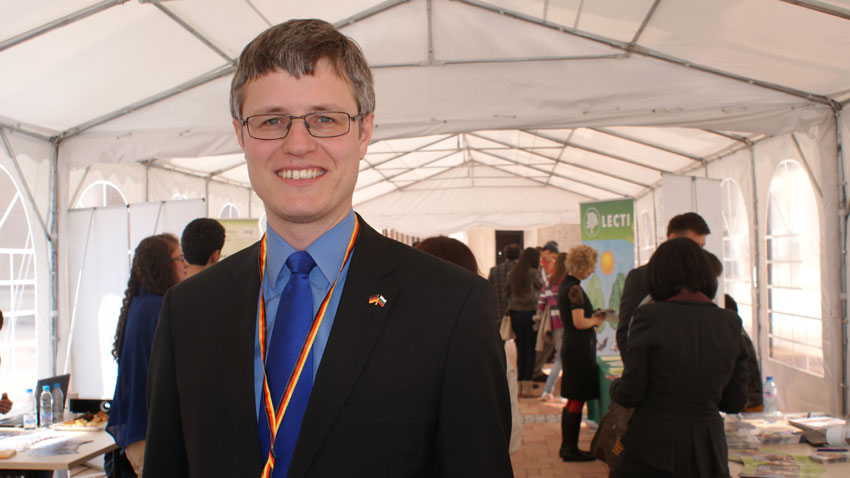Bulgarian university students in Germany are about 8000, accounting for one of the largest foreign student groups in the Federal Republic. German universities are by tradition strongly appealing for Bulgarians. Even in the early 20 c. the Bulgarian elite, mostly in engineering science, was trained in Germany. The trend is very much underway today: one reason for the German Embassy in Sofia to organize an education fair for the second time. Earlier this week, officials from more than 40 kindergartens, schools and universities from Bulgaria and Germany consulted and informed visitors about German language learning programs and opportunities to study in Germany.
Starting early in the morning, many young people gather outside the German Embassy to have a look at the booths arranged there. They take brochures away and ask questions about ways to apply for German universities. Most of them are fluent in German. Sylvia Danovska has stopped by Bavaria’s booth. She is on the lookout for a suitable MA program. She has an MA in international economic relations but is getting ready for further education in Germany.
“I am after something new and different. Both my BA and MA degrees have been obtained in Bulgaria and I now want to have an MA in Germany because I believe in the high quality of education there.”
11 grade student Dimitar Ivanov has been preparing for university training in Germany since he enrolled in high school. He has a very clear idea what he wants: to study aviation engineering. He has travelled 100 km from his native town Pleven to learn more straight from the horse’s mouth – at the booth of the Technical University in Munich.
“They have this major but only after a BA degree, with an MA program. I like the conditions at the Technical University and I have been hard to prepare for the German language exam at the high school in Pleven.”

The education fair at the German Embassy is welcome for Sylvia and Dimitar. Matthias Dehner, head of the Cultural Department at the Embassy, is happy with the great interest.
“We see the traditionally large number of Bulgarian students in Germany as a symbol of the intensive cultural exchange between the two countries”, Dehner says.
However, this process can also be seen as a brain drain from Bulgaria: “This is a fairly complex issue and is currently hotly debated in Germany. However, it should be discussed in the larger context of the European Union”, Dehner believes. “European Union’s future requires more diverse experience of its citizens, both personal and professional, gained in different member countries. Anybody who is trained in a German university is the master of his life. He shall decide whether to stay on in Germany or return for a career in Bulgaria. Our observations confirm that many Bulgarians return to their home country for successful careers here. I think that the EU develops very dynamically and with time the exchange of staff will reach a desirable balance.”
English version: Daniela Konstantinova
"We cannot escape from modern technologies, but we must think about how we can use artificial intelligence to improve the quality of education without losing human contact," said Mimi Nicheva, head of the Bulgarian Sunday School "Sts...
Nearly two centuries ago, in the distant 1838, the Bessarabian Archbishop Dmitry Kishinev and Khotinsky consecrated the magnificent Orthodox church "The Holy Transfiguration of the Lord" , built with voluntary donations and labor by the Bulgarian..
Bringing youthful energy, colour and cheer to the Bulgarian National Radio studio, students from the Bulgarian Sunday School Dr Petar Beron arrived from Larnaca. The group from Cyprus — 16 pupils aged between 14 and 19 — is currently on a week-long..
“The end is near – let’s go out with style!” This is the motto of the 2026 Gabrovo Carnival, marking the start of the so-called fifth season of the..
Bulgarian compatriot Nina Vasileva-Zaneshev is one of the examples among the diaspora abroad, who give us confidence that wherever they..

+359 2 9336 661
